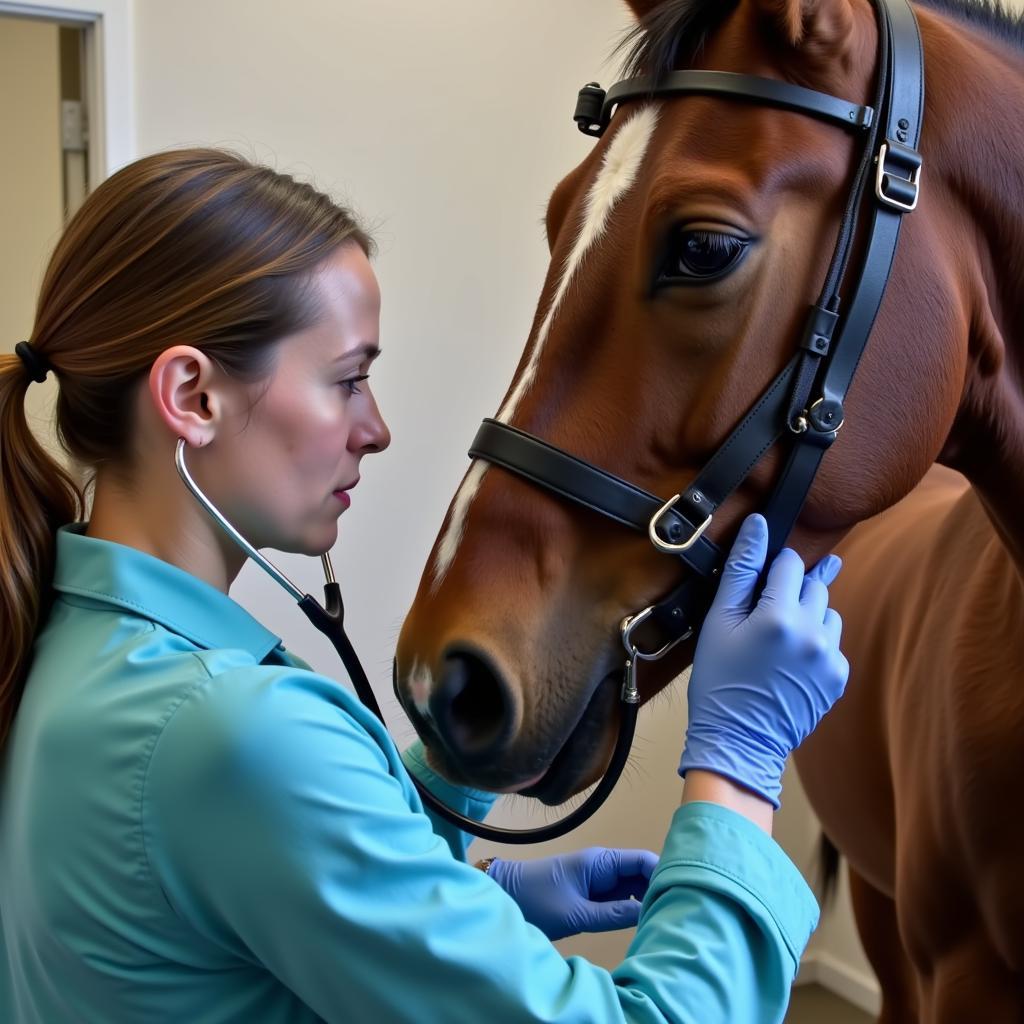Ketamine is a powerful anesthetic commonly used in veterinary medicine, especially for equine procedures. Understanding its applications, benefits, and potential risks is crucial for responsible horse ownership. This article explores ketamine’s uses in horses, including situations where a PDF resource might be beneficial for detailed information.
Understanding Ketamine and its Role in Equine Anesthesia
Ketamine is a dissociative anesthetic, meaning it disrupts the brain’s normal communication pathways. This results in a trance-like state where the horse is unresponsive to pain and its surroundings. It’s often used in combination with other drugs for both short and more complex procedures. While finding a comprehensive “What Is Ketamine Used For In Horses Pdf” might be challenging, this article aims to provide extensive information covering many aspects of the drug’s use in equines.
Common Uses of Ketamine in Horses
Ketamine offers several advantages in equine anesthesia, making it a versatile choice for veterinarians. It provides rapid pain relief and muscle relaxation, crucial for various procedures. Here are some common applications:
- Short Procedures: Ketamine is often used for quick procedures like wound stitching, dental work, or minor surgeries. Its rapid onset and relatively short duration make it ideal for these situations.
- Field Anesthesia: Ketamine’s portability and ease of administration make it a valuable tool for on-site procedures where full general anesthesia isn’t feasible.
- Part of a Balanced Anesthesia Protocol: Ketamine is frequently combined with other drugs, like sedatives and analgesics, to create a balanced anesthesia plan for more complex surgical procedures. This allows for lower doses of each drug, reducing potential side effects.
Dosage and Administration of Ketamine in Equines
The appropriate dosage of ketamine for a horse depends on various factors, including the animal’s weight, age, overall health, and the specific procedure. A qualified veterinarian will always determine the correct dosage. Ketamine can be administered intravenously (IV) or intramuscularly (IM). IV administration leads to a faster onset of effects, while IM administration offers a longer duration.
Potential Side Effects and Risks of Ketamine in Horses
While generally safe when administered by a trained veterinarian, ketamine can have potential side effects, just like any medication. These may include:
- Increased heart rate and blood pressure
- Respiratory depression
- Muscle rigidity
- Recovery delirium
Monitoring and Post-Operative Care after Ketamine Use
Close monitoring during and after ketamine administration is essential. The veterinarian will monitor the horse’s vital signs, including heart rate, respiration, and blood pressure. Post-operative care involves providing a safe, quiet environment for the horse to recover fully. Pain management might be necessary, and the veterinarian will provide specific instructions for aftercare.
Finding Reliable Information about Ketamine for Horses
While searching for a specific “what is ketamine used for in horses PDF” might not yield a comprehensive document readily available online, reputable veterinary websites, university extension services, and professional veterinary journals are excellent resources. Consulting with your veterinarian is always the best way to get tailored information specific to your horse’s needs.
Conclusion: Utilizing Ketamine Responsibly for Equine Health
Ketamine plays a vital role in equine veterinary practice, enabling a range of procedures from routine check-ups to complex surgeries. While a concise “what is ketamine used for in horses PDF” may be elusive, understanding its uses, risks, and proper administration is crucial for ensuring your horse’s safety and well-being. Always consult with a qualified veterinarian for guidance on the appropriate use of ketamine for your equine companion.
 Veterinarian Examining a Horse
Veterinarian Examining a Horse
FAQ
- What type of anesthetic is ketamine? Ketamine is a dissociative anesthetic.
- How is ketamine administered to horses? Ketamine is typically administered intravenously or intramuscularly.
- Is ketamine safe for horses? Ketamine is generally safe when administered by a trained veterinarian.
- What are the potential side effects of ketamine in horses? Potential side effects include increased heart rate, respiratory depression, muscle rigidity, and recovery delirium.
- Why is monitoring important after ketamine administration? Monitoring is essential to ensure the horse’s vital signs remain stable during and after the procedure.
- Where can I find more information about ketamine use in horses? Consult with your veterinarian or reputable veterinary resources for more information.
- Can I administer ketamine to my horse myself? No, ketamine should only be administered by a licensed veterinarian.
Need help? Contact us at Phone Number: 0772127271, Email: [email protected] or visit our address: QGM2+WX2, Vị Trung, Vị Thuỷ, Hậu Giang, Việt Nam. We have a 24/7 customer service team.